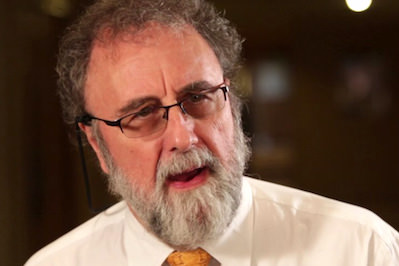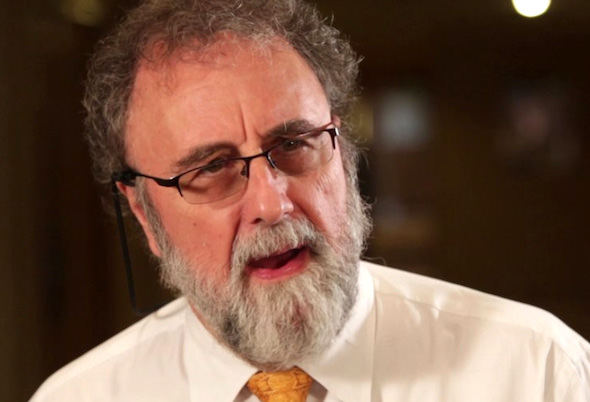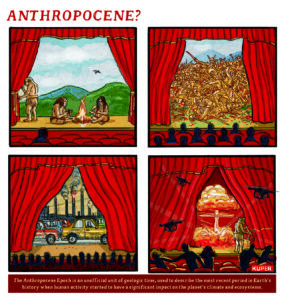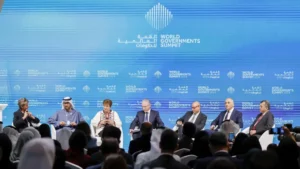Truthdigger of the Week: Sir Robert Watson, British Climate Expert
With pressure from the likes of Watson, a sleeping public may awaken to and act upon the imminent dangers of climate change.

Sir Robert Watson. (Future Earth / Creative Commons)
Every week the Truthdig editorial staff selects a Truthdigger of the Week, a group or person worthy of recognition for speaking truth to power, breaking the story or blowing the whistle. It is not a lifetime achievement award. Rather, we’re looking for newsmakers whose actions in a given week are worth celebrating.
Roughly 200 years after humans sparked global warming, Sir Robert Watson and his colleagues at the Universal Ecological Fund addressed the public about climate change with a clarity that is rare for major institutions. “Climate change is happening now,” the international group of climate scientists wrote in a report titled “The Truth About Climate Change.” And it’s happening “much faster than anticipated.”
The scientists are attempting to correct the impression that climate change is a far-off problem, when in fact it’s playing out right now.
How did we get here? The “urgency of climate change has been misunderstood by most,” the group continues. Authoritative bodies such as the Intergovernmental Panel on Climate Change (IPCC) produce reliable studies, but the vast majority of the public doesn’t hear from the scientific community directly. In addition, the group says, “Information from these other sources has often been confusing for the public.” And to compound the problem, “there has been deliberate misinformation from deniers and sectors with vested interests in maintaining the current situation.”
Indeed, journalists recently showed that executives at ExxonMobil knew about the dangers of climate change 40 years ago and kept their knowledge a secret. In September, U.S. environmental activist Bill McKibben said that the public must “check the power of the fossil fuel industry. … It’s going to take an immense amount of work, but if we don’t win, then there won’t be any future.”
ExxonMobil spent as much as $10 million per year between 1998 and 2005 to spread misinformation about climate change, and after pledging to stop funding “denial” groups, executives continued to back the American Legislative Exchange Council and members of Congress who obstructed legislation aimed at curbing practices that cause climate change.
ExxonMobil and other oil companies succeeded splendidly at confusing people. “This miscommunication of climate change has created some misunderstandings in the public, which has led many to perceive climate change as abstract, distant and even controversial,” the UEF scientists continued. “As a result, what is actually happening with the climate and the immediate actions required to address climate change have been misunderstood.” Many people, for instance, have been convinced that burning coal, gas and oil is essential to economic growth, as if the production and maintenance of wind turbines and solar panels doesn’t create jobs.
Despite their work, many experts—including the IPCC—have fallen short of their commitment to the truth in relationship to the public. British climate scientist Peter Wadhams criticized his fellow scientists in September for failing to fully represent the dangers of climate change to the public. They “were too frightened of [losing] their jobs or losing their grants to spell out what was really happening,” he told Climate News Network. Wadhams cites measurements he took personally to predict that ice in the Arctic will disappear in the summers by 2020—30 years ahead of IPCC estimates.
“They know it is happening, but they do not want to frighten the horses,” Wadhams said. “It is bordering on the dishonest.”
Watson and company don’t sugarcoat the facts; they plainly describe what must be done to avert the worst effects of climate change. If implemented and improved upon, the decisions made at the United Nations climate conference in Paris at the end of 2016 “will affect and benefit all of us. Over the next few years, we will have to produce energy from low-carbon sources, use energy more efficiently, travel less and even change our diets. The climate will still continue to change and we will continue to experience unusual weather everywhere.” Europe, for example, faces high winds and flooding estimated to cost more than $210 billion annually by 2070, in addition to the many lives likely to be lost if infrastructure is not updated to account for the frequency and intensity of storms.
Though the Paris accord established an international “pledge and review” system for monitoring signatory countries’ efforts to oppose climate change, the efforts are only reviewed every five years, and “current pledges” are “far from sufficient to put the world on a pathway to meet the average temperature rise target of 2 degrees Celsius,” according to the UEF report. Though temperatures have risen by about 1 degree on average, a delay by decades in the heating effect of atmospheric carbon means the amount of carbon already in the atmosphere is enough to rise 1½ degrees Celsius. And because any global target temperature rise is an average, a 2 degree rise would be devastating, as much of the world would undergo a rise of 3 degrees or more. Moreover, the agreement’s nonbinding international pledges are “subject to approval at the national level through policies, regulations and incentives for their implementation in each country. Thus, pledges may be changed, raising or reducing the overall [greenhouse gas] emission reduction targets.”
Getting to net zero carbon emissions could be achieved with the rapid build-out of renewable energy infrastructure, a doubling of the earth’s forest cover, carbon capture and storage technology, and machines that remove carbon from the atmosphere, the authors wrote. But many technologies are unproven at a large scale and others remain to be developed.
“As the number of weather-related events due to climate change continues to rise, their impact on water resources, food production, human health, services and infrastructure in urban and rural areas, among other sectors, will be more frequent and intense,” the authors continue. “Some of the impacts of climate change may be beneficial, while most will not, negatively impacting lives and livelihoods everywhere.”
But there is reason to hope, so long as hope is joined with action. “There is still time to slow down the current path towards reaching the 2 degree C target within the next few decades,” the authors conclude. “First, and most importantly, there are still four years before the implementation of the [pledges] in 2020. By 2018, all countries agreed to revise their pledges—sufficient time to significantly raise the ambition of actions to reduce [greenhouse gas] emissions and to adopt the necessary policies for their effective implementation in all countries. Second, the IPCC has already committed to improving its communications to make their reports more accessible for the public to understand.”
Will the IPCC get better at informing the public? With pressure from the likes of Watson, it may. For this reason, Sir Robert Watson is our Truthdigger of the Week.
Independent journalism is under threat and overshadowed by heavily funded mainstream media.
You can help level the playing field. Become a member.
Your tax-deductible contribution keeps us digging beneath the headlines to give you thought-provoking, investigative reporting and analysis that unearths what's really happening- without compromise.
Give today to support our courageous, independent journalists.






You need to be a supporter to comment.
There are currently no responses to this article.
Be the first to respond.